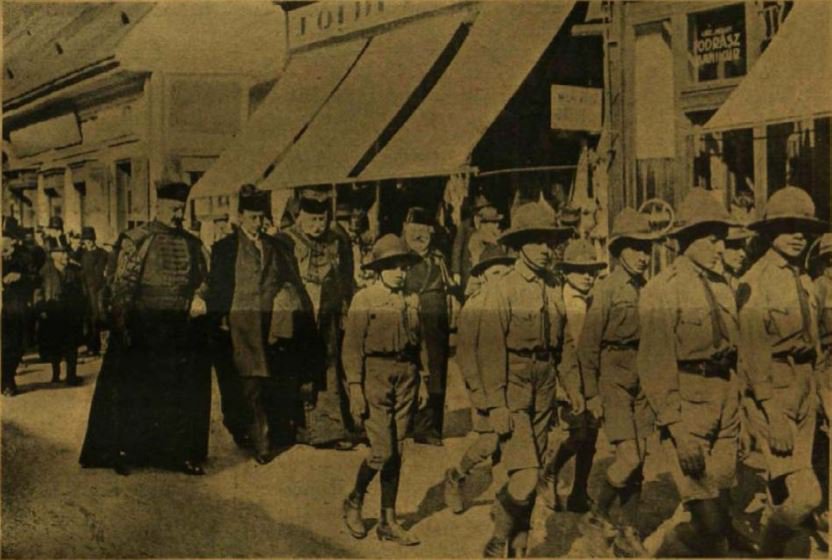
The inauguration of Danubian Reformed Bishop László Ravasz: the new bishop is walking from church to the Ráday St. offices of the Reformed Church
„During those festive days, László Ravasz became the most popular person in Budapest: he was suddenly fashionable. Not for his personality, but for the great and holy interests that he represents so splendidly. We sincerely hope that he shall remain in vogue for good,” wrote a reporter for the Sárospataki Református Lapok in the autumn of 1921, when – now exactly a hundred years ago – on 1 October László Ravasz was inaugurated as bishop. Bishop Ravasz was indeed a popular and much sought-after man, as the journalist at the time put it, he became “fashionable”.
Our paper, Reformátusok Lapja, a few months ago already devoted space to describing the inauguration of Bishop Ravasz, mentioning that the largest newspapers reported on this significant event at the time. Since then, we have learnt a lot about Ravasz. He lives on in our collective memory as an outstanding and scholarly church leader, public figure, a Reformed bishop persecuted by the Communists, only to return briefly but significantly to public church life after 1956. From an interview he did in the mid-1920s, however, we can also find out that he was a man with a great sense of humour, who was interested in modern life and well-versed in literature, happy to talk to a journalist even in his free time.
The way the interview came about was that Bishop Ravasz welcomed a journalist of Budapesti Hírlap (one of the most significant dailies of the time) for a couple of hours “between two trains” in his summer house in Balatonlelle, wearing “petty bourgeois, blue, casual clothes”. “One of the busiest people in the country” and the journalist interviewing him sat down in “loungers” placed under a maple tree in the garden.
“I am primarily interested in his memories and experiences, his childhood and his early career. A hint of a smile, a playful grimace appears on his face, and then he bursts into laughter: I am happy to talk about these, but I am not sure you will like what you hear,” writes the author, quoting the bishop, and then goes on to describe Ravasz’s early memories from his first reading experiences to his evaluation of Hungarian literature. We can read about his teenage missteps, his views on the Scout movement, and it is also revealed that the bishop had a serious case of food poisoning recently, but “has quite recovered since then, his complexion is superb”.
We might find it hard to believe today that the late bishop’s career as an orator – who at the time of the article was preparing for his academic inaugural speech – did not start without a hitch. He described his recital of a poem at the age of eight as follows: “Let there be no mistake: I had very limited success with my first public performance, and later that night, back home my mother remarked: ‘My son, I feel that you will not go far either with your singing or public speaking’. It is hardly surprising, then, that it took me some six years to attempt public speaking again.” When it finally happened, he had to give a farewell address at school, and then in secondary school he was editor of the student newspaper, but one of his editorials, as he referred to it, became his downfall.
The article presents László Ravasz as an average person: the bishop is “extremely friendly, a pleasant talking companion, with no sign of a brooding scholar in an ivory tower; his presentation and remarks are full of discreet and succinct humour,” says the journalist, who really appreciated the warm welcome.
As for the hospitality in the Ravasz household, we can read in the article that: “The minutes go by fast, eventually Mrs. Ravasz also arrives home from the lake with the children, and we sit down to have lunch. […] Normally, none of the company drink wine, but, assuming the worst about a journalist from the capital city, this time there is some local wine on the table […] The journalist is dropped off at the railway station by the whole family, despite the unpleasant shower that accompanies us on the three-hundred-step journey. Here the olden flavour and consistency of hospitality is still very much alive,” sums up the reporter of Budapesti Hírlap the memorable few hours he spent with László Ravasz and his family.
The author is a journalist and a historian
"He believed and He obeyed"
The Danubian Church District of RCH convened a solemn District Assembly on 1 October remembering the inauguration of László Ravasz. Bishop Zoltán Balog preached the Gospel. Former Bishop István Bogárdi Szabó gave a lecture.
Originally published in Reformátusok Lapja, the Weekly of RCH. Translated by Erzsébet Bölcskei